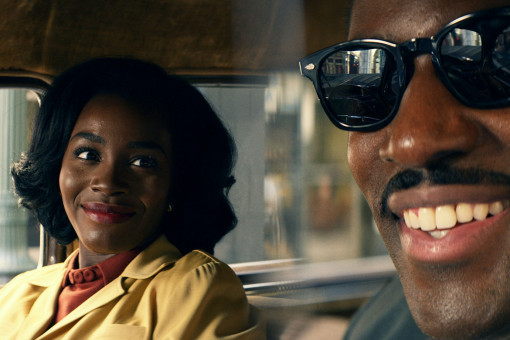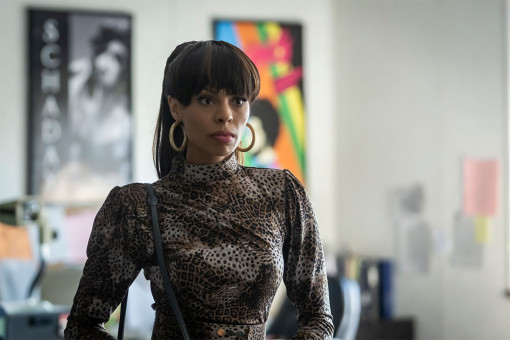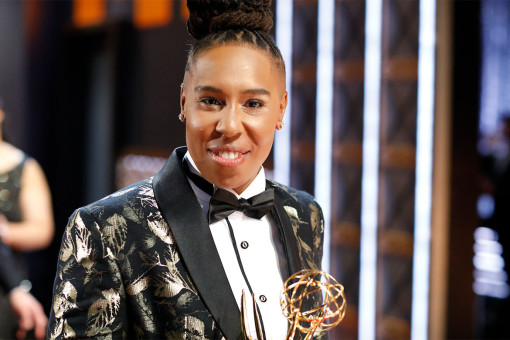Diversity, Inclusion, and Innovation were the resonating themes at the Producers Guild of America's 10th annual Produced By Conference on June 9 and June 10th at Paramount Pictures Studios in Los Angeles.
Nearly 1000 people attended the event which consisted of nine mentor roundtables and 12 speaker sessions including the headlining panels: "Conversation With: Jim Gianopulos & Neal H. Moritz," "Conversation With: Kevin Feige," "Larry Gordon: Uncensored," "and "360 Profile: The Handmaid's Tale."
"We talked about every ethnicity for every role," Handmaid's Tale casting director Sherry Thomas revealed, with series EP Warren Littlefield adding: "The minority casting in the show was a strategic decision. We engaged with Margaret (Atwood) in an effort for this to feel like this exists in the world today and that opened the doors for Sherry to be brilliant."
Reaching across film, television and new media, PGA's Produced By Conference is an educational forum conducted by acclaimed producers and numerous Oscar and Emmy winners, as well as the next generation of content creators, which aims to inspire those working in the producing profession.
It is the only conference specifically created by producers, for producers, where creative entrepreneurs connect with their peers and learn how to enhance their pitch and storytelling skills, how to finance, develop, and market their project, as well as learn the latest technology through panels such as "Produce Smarter: Ai, Machine Learning and Content Creation," a conversation about how artificial intelligence and machine learning will change the way people work in the next several years.
"Everything is being hybridized right now. TV looks like film, comedy looks like drama, dramas look like comedy and documentaries look like major motion pictures," noted writer/director Marta Kauffman (Friends, Seeing Allred) during the "What Makes A Doc A Doc?" panel.
"Everything is finding its new voice. I think it makes perfect sense that at this point, producers and filmmakers want to find a new way of doing things, partly to stand out from the crowd," she added.
"Documentaries are, in some ways, no different than a scripted show. In that, you constantly have to be on your feet and learn from what you do. So if you shoot a segment and you thought it was going to be one thing and it's something else, you have to go with that. You can't fight against what you get," Kauffman explained.
"Same with a scripted thing, if a joke doesn't work you can't fight against that. You gotta keep moving and re-write it. If a story isn't working in a scripted series, you have to throw it up in the air and see how it falls and re-work it. Sometimes you think you know what the story is but very often the film will tell you what the story is."
Some of this year's Produced By speakers included Dan Harmon (Rick and Morty), Charles D. King, Founder and CEO of MACRO, Justin Simien (Dear White People) and Emmy-winner Lena Waithe. During the Q&A of the "Powerful Voices: Telling Stories That Rewrite The Rules" panel, Waithe was asked how to make Hollywood "less scared" of diverse storytelling.
"There are more bad scripts than good ones So I feel like folks should be spending more time working on their craft. Don't worry about assuring anyone or anything," she offered. "Go be dope. My advice always is, go be great."
Using the analogy of announcers at basketball games, Waithe added: "Whose name do the announcers always say? The ones that are making plays. If you ain't making plays, they ain't talking about you, go out there and get talked about."
Simien also advised producers and content creators of color to "Be undeniable because we do have to work harder but that gives us the opportunity to be undeniable with our craft."
During the "Producing An Inclusive Industry" panel, Emmy-award winner and Funny or Die CEO Mike Farah responded to one producer's revealing statement about feeling like she is at the "bottom of the food chain" because she's a woman of color.
"What a terrible feeling to think you're at the bottom of the food chain when I think that can really be your superpower," he said, noting that diversity and inclusion is "an organic process."
"It doesn't happen overnight. But that's what's important about keeping this dialogue open because people are listening to it and you see that it's within reach."
But producer Stacy Rukeyser (UnREAL, The Lying Game) was quick to remind the room that in this modern age of "isms" (sexism and racism), "sometimes" you STILL "need that 60-year-old white dude to vouch for you."
MACRO's Charles D. King confessed that having a slate of films with diverse content has not made "it easier" for him as a producer, "But I would say that the marketplace is more receptive to diverse storytelling," he said during the "Financing Your Film: How To Find The Right Partners" panel.
The first day of the conference concluded with the PGA's annual General Membership Meeting where Gail Berman and Lucy Fisher were announced as the Guild's newly elected presidents. Their election is historic for the PGA as it marks the first time two women will serve as Presidents of the Guild.
As a return engagement, on day two of the conference, Produced By 2018 presented the "Producers Mashup," an exciting event that offered attendees the chance to ask direct questions of a variety of veteran producers and development executives.
"If it's about collaboration and you're looking for a writer with a pitch then listen for the opposite of what your instincts might say," Dan Harmon advised during "The Innovation Panel."
"Look for something that sounds unsellable," he added, with producer Randy Barb (RuPaul's Drag Race) stressing that producers "have to go out there find ways to grow what you're doing."
Harmon has created content for four networks and across different platforms and his strategy and formula for success has been the opposite of what he described as "Idea Worship."
"I'm not a big fan of idea-worship," he said. "I think people make the mistake of trying to come up with an idea. Television, in particular, is a comfort tool and the best TV idea is just a generic foundation. It's the execution. It's the actors that you discover. It's the stories that you tell that make a show good or bad. Because it starts with a script, I always look for what I think non-writing executives look for, which is a writer who is passionate about something," Harmon explained.
"This is a great time for point-of-view. Point-of-view is really selling. Everything is about point-of-view and we've discovered that it doesn't have to be relatable. You don't have to be black to watch Atlanta, you can even acknowledge that you don't understand 30% of it if you're white and you like it that way."
During the panel on "Producing An Inclusive Industry," Gail Berman served as moderator and kicked things off by asking: "What does it mean to be inclusive?"
Director Paul Feig (Bridesmaids) stated that "inclusive" means "changing the default setting."
"So before you automatically hire the guy, you go, "Oh wait, could a woman do this? Could a person of color do this?" And the minute you just change that then you start looking at more people and you help to grow the pool of people who are considered legitimate by the studio," he added.
"Being a producer, being a creator, working in Hollywood" is a "hard job," said Farah during the panel. "And then to add these human elements to it is just another layer, and that's why it has to start with the top.
When it comes to "diverse" and "inclusive" content and "more people of color" working behind the scenes, Farah explained that "It has to be a holistic appreciation to these types of values."
"The political environment has inspired us to say more and do more and be more fearless," Barb said during the Q&A. "Voices need to be loud right now."
A sentiment echoed by Beatrice Springborn, VP of Content Development at Hulu, who said the streaming service is always looking to collaborate with "new voices" with "contemporary and provocative" content.
"The new environment inspires people like us to produce more of the stuff that we've always been inspired by," said Barb.
Attorney Nancy Solomon touched on a myriad of points concerning sexual harassment in the workplace, from "retaliation" to "what happens when the harassment comes from the boss?"
"Encourage people to protect each other," she suggested during the "Inclusive" panel as a way to help change the climate.
"Everyone in this room is a producer, right? These are the people who can change that. At some point, producers need to act," Mike Farah added.




















